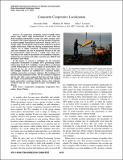Consistent cooperative localization
Author(s)
Walter, Matthew R.; Bahr, Alexander; Leonard, John Joseph
DownloadBahr-2009-Consistent cooperative localization.pdf (490.1Kb)
PUBLISHER_POLICY
Publisher Policy
Article is made available in accordance with the publisher's policy and may be subject to US copyright law. Please refer to the publisher's site for terms of use.
Terms of use
Metadata
Show full item recordAbstract
In cooperative navigation, teams of mobile robots obtain range and/or angle measurements to each other and dead-reckoning information to help each other navigate more accurately. One typical approach is moving baseline navigation, in which multiple Autonomous Underwater Vehicles (AUVs) exchange range measurements using acoustic modems to perform mobile trilateration. While the sharing of information between vehicles can be highly beneficial, exchanging measurements and state estimates can also be dangerous because of the risk of measurements being used by a vehicle more than once; such data re-use leads to inconsistent (overconfident) estimates, making data association and outlier rejection more difficult and divergence more likely. In this paper, we present a technique for the consistent cooperative localization of multiple AUVs performing mobile trilateration. Each AUV establishes a bank of filters, performing careful bookkeeping to track the origins of measurements and prevent the use any of the measurements more than once. The multiple estimates are combined in a consistent manner, yielding conservative covariance estimates. The technique is illustrated using simulation results. The new method is compared side-by-side with a naive approach that does not keep track of the origins of measurements, illustrating that the new method keeps conservative covariance bounds whereas state estimates obtained with the naive approach become overconfident and diverge.
Date issued
2009-07Department
Massachusetts Institute of Technology. Computer Science and Artificial Intelligence LaboratoryJournal
IEEE International Conference on Robotics and Automation, 2009. ICRA '09
Publisher
Institute of Electrical and Electronics Engineers
Citation
Bahr, A., M.R. Walter, and J.J. Leonard. “Consistent cooperative localization.” Robotics and Automation, 2009. ICRA '09. IEEE International Conference on. 2009. 3415-3422. ©2009 Institute of Electrical and Electronics Engineers.
Version: Final published version
Other identifiers
INSPEC Accession Number: 10749164
ISBN
978-1-4244-2788-8
ISSN
1050-4729
Keywords
Sensor Fusion, Cooperative Localization, Cooperative Navigation